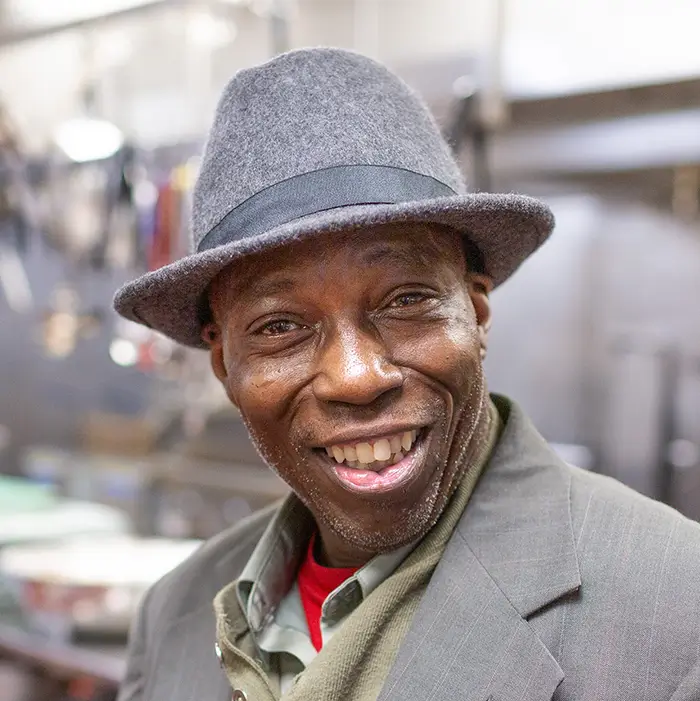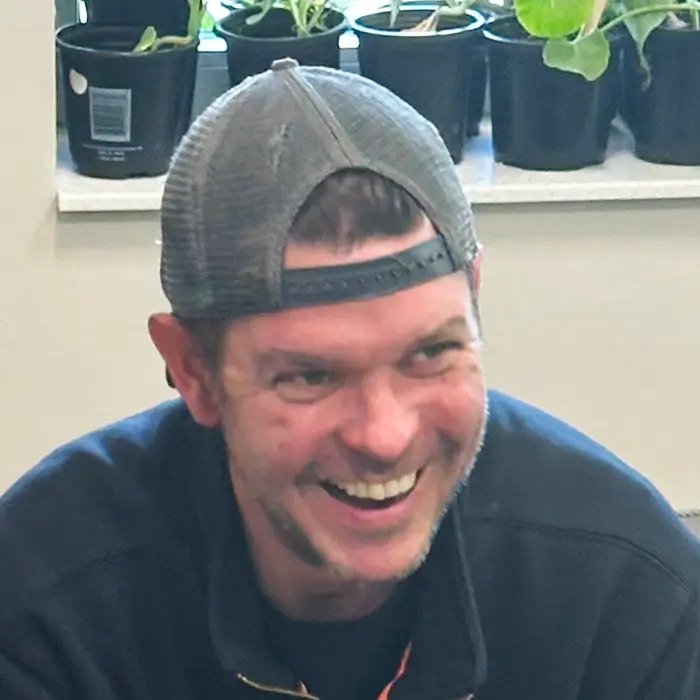Innovation Across Iowa
The continuous generosity of our supporters has helped CISS build a crucial foundation for the future. This includes innovative solutions that will change the landscape of how we approach homelessness and food insecurity support and prevention in our state.
Many Iowans are living paycheck to paycheck, just one or two unexpected
circumstances away from facing the realities of homelessness or food insecurity. Especially if they don’t have family or a secure support system nearby.
Behind the faces you see below are real stories of adversity. Some of these faces belong to people who leaned on CISS in hard times. Some belong to CISS employees who help people rewrite the next chapter. And in some cases, both things are true.
The reality of homelessness is that it can happen to any of us.
STORIES

Kitchen, Food, Shelter, Post-CISS
Jerome
Jerome lived on the South Side of Chicago, working hard to provide for his family — all while grappling with substance use and other challenges.
Read Jerome's Full Story
Once his son was grown, Jerome knew it was time for a fresh start. Equipped with a few personal belongings and a powerful work ethic, he hopped on a bus headed for Iowa.
After a while, Jerome recognized the signs of a path similar to the one he’d left behind. Not wanting to revisit the same pitfalls, he decided to change direction by seeking refuge at Central Iowa Shelter & Services. In just one month, he secured a job and bid farewell to the emergency shelter. However, he soon returned — this time as a leader in CISS’ community kitchen.
While working in the kitchen, Jerome had undoubtedly found his calling. His infectious enthusiasm and unparalleled work ethic make an impact far beyond the kitchen. He has become a mentor and friend to all who cross his path, often encouraging others by saying, “If I did it, I know you can do it.”
Jerome’s story is a testament to the power of hard work, perseverance, and belief in oneself while on the road to redemption.

Growth Financial Services
Rob Jesmer
Rob is a U.S. Veteran who turned to CISS for help while struggling financially. He was living paycheck to paycheck, burdened by over $20,000 in debt.
Read Rob's Full Story
He earned a steady income working as a temp welder, but money management challenges and a battle with substance use made it hard to dig himself out of the hole, get the help he needed, and get ahead financially.
While at CISS, Rob met with his case manager, set goals, and began repaying debt so he could move into his own apartment. Growth Financial Services helped him stay accountable, build structure, and receive guidance — much like navigating sobriety.
Working with a dedicated payee, Rob helped craft his plan for tackling debt. Of course, he faced the temptations of old habits, but he focused on saving money and practicing healthy spending habits. Today, he is debt-free and transitioning to permanent housing. In addition to joining the Navy, Rob considers sobriety and enrolling in Growth Financial Services to be the best decisions he has ever made. He looks forward to embracing life with loved ones, excelling in his welding career, and sharing the power of “taking the reins” on one’s life.

Job Training
Tinesha
Tinesha was working as a CNA, creating a successful future for herself, when she was hit with a cascade of unexpected obstacles.
Read Tinesha's Full Story
Her final breaking point was a costly and frustrating barrier we all fear: car failure. Without transportation, she couldn’t work, and the foundation she’d built began to collapse.
But Tinesha was determined and turned to CISS for housing and support, immersing herself in opportunities for growth and empowerment. Before long, she transitioned into a single-unit efficiency apartment. Then, a job training opportunity caught her eye, and she began working in the Schoen Greenhouse. Tinesha found fulfillment in nurturing plants and fostering growth —much like the plants, she began to flourish.
She also finds fulfillment in serving others, especially by volunteering in CISS’ kitchen. “When you don’t have a space to do the things you like, sometimes you have to improvise,” she said. “Since I don’t have a kitchen, I might as well join this kitchen and help where I can.”
She is currently exploring an opportunity at a local greenhouse and views it as a stepping stone toward achieving self-sufficiency. “Ultimately, I am working to get my own place and be the best that I can.”

SHELTER, APARTMENTS
Atem
From the warmth of a roof over his head to the guidance of dedicated case managers, Atem found solace and stability within CISS’ emergency shelter. It was here that he discovered a pathway to rebuilding his life, seizing every opportunity to learn and grow.
Read Atem's Full Story
At just 10 years old, Atem found himself forced into a Civil War, joining the child soldiers in Southern Sudan who were fighting for independence. The scars of battle marked his young life, both physically and emotionally, as he experienced the hardships of war and separation from his family.
After just two years as a child soldier, Atem endured extreme violence and miraculously recovered from two gunshot wounds, with one striking him in the head. Despite all of this, Atem’s will to live and hope for a better life empowered him to make the journey to a refugee camp in Kenya, where aid and compassion awaited. From there, the refugee camp was able to help relocate children like Atem — a group now known as the Lost Boys of Sudan.
His journey initially took him to Nashville, Tennessee, where catholic charities accepted him and fellow Sudanese children with open arms. Against all odds, he not only completed high school but pursued higher education, earning a bachelor’s degree in business management. As he worked to map out a successful life for himself, he was drawn to Iowa for employment.
Cultivating new friendships at work, Atem decided to move in with friends but found himself caught in the temptations of a carefree lifestyle. Realizing the path that he was going down was not what he envisioned for himself, he made the courageous decision to seek help. He made the hour-long trip to seek emergency shelter at CISS — successfully removing himself from a toxic and dangerous environment.
From the warmth of a roof over his head to the guidance of dedicated case managers, Atem found solace and stability within the shelter. It was here that he discovered a pathway to rebuilding his life, seizing every opportunity to learn and grow. By immersing himself in the shelter’s programs and flourishing as a greenhouse trainee, Atem was able to quickly transition out of the emergency shelter and into CISS’ single-efficiency apartments — reclaiming his independence. Grateful for the sanctuary it provided during his most challenging moments, he acknowledges the vital role the emergency shelter played in offering him a safe haven with a supportive community.
Atem’s journey is a testament to the power of perseverance and faith. He credits the emergency shelter for giving him the safety and structure he needed when there was nowhere else for him to turn. Looking ahead, he is eager to pay forward the kindness he received. His current goals include attaining a job that allows him to help people, getting his own apartment in the city, and living a simple life.

HOUSING COMMAND CENTER, STREET OUTREACH
Dee
As Dee and her street outreach team continue their mission to end homelessness in Central Iowa, they remain devoted to their belief that with compassion, support, and determination, anything is possible
Read Dee's Full Story
The Street Outreach initiative at CISS is designed to serve individuals experiencing homelessness by meeting them, understanding their unique needs, building trust, and encouraging the transition into shelter. Whether it’s in Polk County or any of the other 14 counties within the Rolling Hills region, the Street Outreach team identifies and visits various camps and locations to meet individuals experiencing homelessness where they are.
To Dee, the Director of Client Advocates and Street Outreach, this initiative goes beyond just contacting clients; it’s a lifeline for those experiencing homelessness. “We ask individuals where they want to live and what they aspire to achieve,” she explained. “Whether it’s securing a job, obtaining essential items, or reconnecting with their hometown, we tailor our support to their unique needs.”
The Street Outreach team also has a goal of fostering trust and familiarity among staff and individuals seeking shelter. “Having familiar faces makes seeking shelter less daunting,” Dee said. “It’s about creating a sense of belonging and safety for everyone who might walk through our doors.”
To ensure that no one falls through the cracks, the CISS team has added initiatives like the BY-NAME list meeting where they come together to focus on individual needs within the system and determine who can help and how.
As Dee and her team continue their mission to end homelessness in Central Iowa, they remain devoted to their belief that with compassion, support, and determination, anything is possible. For them, working with Street Outreach requires confidence in the mission and a commitment to making a difference. Each meeting with an individual experiencing homelessness is a chance to further develop a space and opportunity for them to believe in themselves so that they understand they can achieve these things even without our staff’s help.
Remembering a specific client, Dee recalls the importance of consistency. “There was an individual who had experienced homelessness for quite a while and battled with mental health and substance abuse,” she remembered. “After getting trespassed from most services throughout the city, he struggled to consistently stay in shelter. We slowly built trust, and he decided to enter our shelter,” she added.
“Unfortunately, he passed while here. As sad as this moment was for us all, we were able to see a visible change and noticed he bought into the sense of community. Fortunately, he was able to experience love and support during his last days — because he finally believed in himself enough to enter the shelter.”
The Street Outreach team’s mindset is that all people have a purpose. To help clients develop this mindset, Dee emphasizes the importance of harnessing the strengths of each staff member within the team and ensuring they consistently show up for clients. By accomplishing this and helping clients celebrate the small wins, the Street Outreach team gets to experience daily miracles.

ROLLING HILLS COALITION
Amber
Amber, serving as Interim Vice President of Operations, has been leading the charge in identifying how CISS can do a better job of reaching people where they are.
Read Amber's Full Story
Amber, serving as Interim Vice President of Operations, has been leading the charge in identifying how CISS can do a better job of reaching people where they are. As Amber emphasizes, an important factor involved with helping those experiencing homelessness or food insecurity is ensuring that they have accessible information and resources available to them.
With Street Outreach serving 15 counties in Iowa through the Rolling Hills Coalition, including many rural communities, it became clear that local resources weren’t always available. The team realized that individuals at risk for or currently experiencing homelessness need additional options to access resources so they can work toward stability.
The team spent hours researching and exploring the most critical needs and pain points. Eventually, their findings evolved into the creation of a comprehensive mobile app that could better serve ALL Iowans.
“It’s important for us to make sure we are connecting those pieces. This is something we have always done, we just wanted to do it on a larger scale,” Amber explained. “We felt that creating an app that provides services that might not be available in rural areas was a natural progression from what we were already doing, as we understood the need for things such as Street Outreach was larger in those areas,” she added.
After completing a housing study in Ottumwa to prove that more funding was needed for outreach initiatives, they discovered that many individuals experiencing homelessness will remain “invisible,” especially in rural areas. Not to mention, these communities have the most underutilized services and the least accessible resources. Amber and the team knew this app could help bridge that gap and allow organizations like CISS to see where individuals are at in the process of getting help.
So, CISS committed to developing the app. The app focuses on the social determinants of health (SDOH) and provides resources and services with complete anonymity.
Amber anticipates the immediate impact of the app to be apparent in how rural Iowans are served. “I am very excited about the potential of this app to identify and proactively limit the number of people experiencing homelessness,” Amber said. “As a shelter with a physical location, we often operate reactively. The ability to have a virtual presence allows CISS to take one more step to be proactive in keeping Iowans in their communities and allowing for an individualized and innovative approach to the unique needs of each person or household.”
The Rolling Hills Coalition has supported 323 households in the last year, helping rural families stay together. This prevents homelessness, prevents children from entering the foster care system, and provides support systems to parents that provide stability and security for their families. “From research, CISS has known that there are several other individuals and families in need, we just haven’t been able to engage virtually to provide solutions,” Amber explained.
As the app starts to become available to Iowans, Amber looks forward to collaborating with other organizations and nonprofits to make this innovative solution even more powerful statewide. “It’s been my life mission to support individuals experiencing scarcity in housing and security for the last thirteen years,” Amber said. “I am most excited to work alongside so many other organizations, communities, and nonprofits that are just as passionate about serving Iowans.”
Honoring Our Heroes
Mitch Wasden, CEO
Iowa Total Care
Iowa Total Care (ITC) provides Medicaid healthcare coverage to eligible Iowans, driven by a mission to transform the health of communities one person at a time.
Read the Full Story on Iowa Total Care
An extension of this mission is demonstrated through philanthropic contributions, including ITC and The Centene Foundation’s $2.55 million commitment to the CISS Housing Command Centers (HCCs) project.
This initiative will prioritize resources for homelessness and prevention in rural communities statewide by applying a tactical, on-the-ground approach to meet people where they are and when they need help. This relies in part on Social Determinants of Health (SDOH), which is a way of measuring stability and identifying potential needs. The HCCs and a new mobile app will both utilize SDOH to connect resources to those in need while also eliminating location barriers.
CISS and ITC often work together to coordinate support for shelter guests. Many ITC employees also volunteer their time at CISS — an effort led by ITC’s Nancy Thompson. After an introduction with CISS CEO Melissa O’Neil, a powerful partnership developed to further both missions at once.
Thank you, ITC and The Centene Foundation, for not only seeing the value of this initiative but also for the incredible contribution that brought it to life.

Bob Stewart
Bob Stewart Connections
Bob has been focused on giving back to the Des Moines community for over a decade, receiving the Community Vision Award for Connecting in 2013.
Read the Full Story on Bob Stewart
He established Bob Stewart Connections, a service group dedicated to local volunteerism, and his network often refers to his introductions as “being Bobbed.”
In fact, CISS CEO Melissa O’Neil, was “Bobbed” many years ago, which connected her with the architect who eventually helped build the campus that CISS calls home today.
Bob has only been volunteering with CISS for a year but has already made an undeniable impact. In the Community Kitchen, he enjoys greeting and talking with guests. He has coordinated multiple volunteer groups and donation drives through his church, his service group, and with business owners in his personal network. This has resulted in partnerships between CISS and local businesses, including Chick-fil-A and Friedrichs Coffee — both of which have donated food or equipment to support the community kitchen.
Giving back is one thing, but it is especially rewarding for Bob to share the experience with his family, especially his grandson, George. The two have been described as a “dream team” and both are eager to make a difference in the lives of others with each shift.
CISS is incredibly grateful to have Bob and his family in our corner. Thank you, Bob, for going above and beyond for our mission without hesitation.

Ryan Arnold, Senior Pastor
St. John Lutheran Church
St. John’s Lutheran Church was one of eight churches that made up Churches United, a traveling homeless shelter that brought low-barrier shelter to the community in 1992.
Read the Full Story on St. John Lutheran Church
In 2006, Churches United became Central Iowa Shelter & Services, and St. John’s has offered unwavering support for over three decades.
Church members have supported the shelter in various ways, but most notably in the community kitchen. Parishioners from St. John’s have provided meals for over 30 years, coordinating a sign-up sheet within the congregation to ensure every dish is assigned and prepared. This also gives every member an opportunity to experience the profound impact and importance of serving others through a meal shift at CISS.
St. John’s members also dedicate their time and talents to the community beyond CISS, working with organizations like Connection Café, Faithful Friends, and The Bridge — which they also played a role in establishing.
Thank you, St. John’s Lutheran Church, for taking the initiative for those in need 30 years ago — and for continuing to take the initiative today.
Honoring Our Heroes
We are excited for the opportunity to uplift and recognize Iowa Total Care, Bob Stewart, and St. John Lutheran Church for stepping up as local heroes for those in our community.
Time and time again, these honorees have gone above and beyond to show compassion and selflessness to those facing homelessness and food insecurity in Des Moines and beyond.
You, too, can be part of the solution to end homelessness and food insecurity in Iowa. Giving back to CISS isn’t just about writing a check. Your gift becomes a token expression of empathy, understanding, and shared humanity for fellow Iowans who have lost their way.
Contact Us
1420 Mulberry Street,
Des Moines, IA 50309
515.284.5719 | 515.883.1692
info@centraliowashelter.org